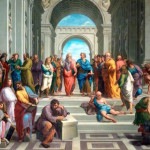Understanding Who God Really Is
by Thomas M. Cothran
Filed under The Existence of God
NOTE: This is the third and final part of a three part series on classical theism by theologian Thomas M. Cothran. Be sure to read part one and part two.
Any defense against Stephen H. Webb’s critique of classical theism must, then, defend some particular form of classical theism that does have an ontology. Webb declares that “Aquinas is the best representative of what is often called classical theism,”1 and so for the remainder of this article, we will consider whether Webb’s arguments hold as against Aquinas, unless Webb has made clear that the target of his criticism belongs to a different school.2
Aquinas is a hylomorphist. Webb identifies hylomorphism as the doctrine that “all beings except Being itself are composed of form and matter,” which is decidedly incorrect. Neither Aristotle nor Aquinas—hylomorphists par excellance—believed that all beings save one are composed of form and matter. Aristotle taught the existence of a number of separate immaterial substances3 and Aquinas believed that angels were immaterial forms.
But Aquinas does believe that physical things are composed of matter and form. Form refers to any way in which a thing is actually determined. Being green, positively charged, dry, or 6 feet long, or having a location, a certain mass, or subatomic spin—all these are “forms” in the general sense in which Aquinas uses the term. “Matter” simply refers to the potentiality in a thing to take on different forms (in the case of accidental change, such as when an apple ripens) or to the potentiality in a thing to cease existing by having its matter incorporated into something else (in the case of substantial change, such as when an apple is eaten). Matter is then the principle that permits a thing to change and that, in the same stroke, renders the thing liable to extinction.
That matter itself is potential, and not actually anything is a crucial point. And only if one misses this point will Webb’s claim that modern science has overturned the classical understanding of matter be plausible. We know more about the nature of blood and the composition of human tissue than did the ancients or the medievals. We know that the fundamental elements resemble the periodic table more than the fourfold of earth, air, fire, and water. Does this mean we know more about matter? If we discover capillaries in the lungs, striation in muscle tissue, the atomic number of a carbon atom, or the charge of an electron, we have gained knowledge of forms inherent in the world—we have learned something about the way things actually are.
Matter in itself is not actually anything; it is the potential of some thing to change or to cease to be. For this reason, it is wrong to say that carbon is, strictly speaking, matter (though it is material).4 Matter refers to the potential to take on different forms. No discovery of modern science overturns this notion of matter—as philosophers such as David Oderberg have pointed out, modern science must actually presuppose this, however tacitly—particularly in studying the basic elements of the universe. To say that a being is material is to say that it is composed of form (actual determinations of the thing) and matter (the potential to take on different determinations). There is no being called “matter”; matter, strictly speaking, is a constitutive principle of material beings.
Because matter refers to that principle in a being which could be otherwise or not at all. No material being exists necessarily, and every material being depends for its existence on parts. Because a statue is made of bronze, there is no necessity that it go on existing. The statue can be melted down and the matter reshaped into something else. Likewise, I am a material being. Some day my matter will be set loose from the human form, and I will cease to be. To be material is in principle to be capable of change and extinction.
Claiming that God is material, then, is to declare God contingent, and consequently to deny that God is a necessary being. Such a move is jarring, of course, because God would be dependent upon not only prior parts, but upon some further necessary being—a being that could not but exist and be what it is.
Conclusion
David Bentley Hart has observed that monotheism and polytheism do not differ by the number of deities they posit, but by what they mean by “divinity.” It was quite common in the ancient world to speak of anything that was intelligent, immortal, and powerful as a god. The revelation of monotheism is not that there is only one of these powerful beings loose in the heavens, but that all beings derive from something not itself a being—at least, a being among other beings. The Jewish and Christian Scriptures assert this ontological difference by dividing all that is into created and uncreated being.
The notion of an infinite cause of finite being that transcends the cosmos believe is signified by the word “God” with a capital “G” (or in Greek, “ho theos,” preceded by the definite article). A being within the world who is distinguished from us by powers such as immortality, greater knowledge, and so on, but who is nevertheless a being in the cosmos is traditionally referred by the word “god” with a lower case “g”, or else been called angels or demons.
Hart notes that the comparatively recent trend of insisting that God is a finite spirit whose existence and personhood are more or less like our own has been called “theistic personalism,” but holds that a better title would be monopolytheism. Monopolytheists assert that there is only one God, but they understand divinity as the ancient pagans did—as simply referring to a powerful spirit within our world of space and time.
Yet one might question the monopolytheist label as descriptive of Webb’s position not because of the “poly” but because of the “mono.” After all, one carbon atom shares the same form as another, but is a different entity because it is composed of different matter. If the eternal Word is essentially material, then he must be a different entity than the Father. Just as I am constituted as a different being than another person by virtue (at least in part) of the difference in what I am made of, so the Father and Son would be different, even if they shared the form of divinity. Or else Father and Son share the same matter, in which case they are but different aspects of the same being. Webb’s view is ineluctably heretical—either polytheistic or modalist. It is no coincidence Webb’s conception of the divine is based on “Mormon metaphysics”; Mormonism is explicitly polytheistic. Accepting the consequences of God’s materiality puts one outside the ambit not only of what is intellectually respectable, but also what is permissible for a Christian to believe.
By now, it should be clear that atheist readers should neither adopt Webb’s criticisms nor confuse his theology with orthodox Christian dogma. And while I have as yet only seen little evidence of the former, there is abundant evidence of the latter. In fact, the new atheists seem insistent that the monopolytheist notion of God is native to Christianity, while the monotheistic notion is some sort of recent academic fabrication. The traditional notion of God as infinite, transcendent, and simple, while neither entailing nor presupposing the doctrine of the Trinity, in fact is necessary for it. The philosophically defensible notion of divinity (the “monotheistic” or classically theist notion) is integral to Christian dogmatics. For this reason, Christians can merrily agree with the attacks of a philosophically dessicated and theologically unsound notion of divinity we too easily find misnamed “Christian.”
Related Posts
Notes:
- Mormon Metaphysics p. 193 ↩
- In fact, Webb often speaks of Aquinas almost as though he is the primary systematizer of a single philosophical tradition known as “classical theism.” For example, Webb states that “Classical theism … did not receive its most systematic treatment until the work of Thomas Aquinas ….”Mormon Metaphysics, 5. ↩
- See Joseph Owens, “The Reality of the Aristotelian Separate Movers,”Review of Metaphysics 3 (3):319 - 337 (1950) ↩
- Aquinas does allow for bones, tissue, etc. to be called matter secondarily. Thus, human beings are made, in part, out of flesh, sinew, tissue, carbon, etc., and in this sense they can be called matter. But these are not matter as such, since they too have forms (chemical composition, physical dimensions, ductility, and so on). One cannot say, for example, that carbon is matter if it has an atomic number of 6, since the latter refers to a form. ↩
Note: Our goal is to cultivate serious and respectful dialogue. While it's OK to disagree—even encouraged!—any snarky, offensive, or off-topic comments will be deleted. Before commenting please read the Commenting Rules and Tips. If you're having trouble commenting, read the Commenting Instructions.













